Ceramic dogs and a sofa for orgies: The most provocative furniture dealer in Paris
Antoine Billore was an art director for perfume and fashion brands before he decided to transform into a furnishings seller with a single guiding principle regarding his wares: that they excite him
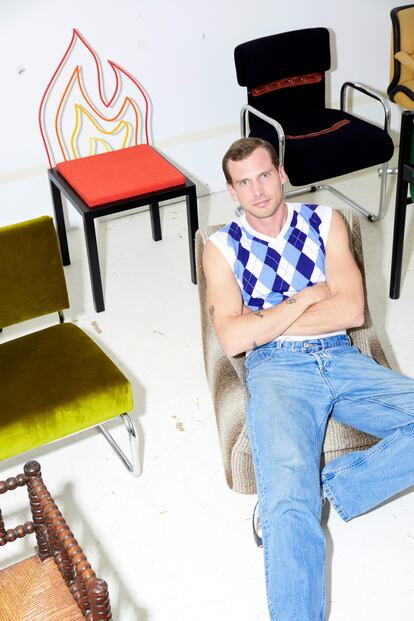
It’s Monday at 11 a.m., but the work day of Antoine Billore (Abbeville, France, 32 years old) began at dawn. “Recently I bought a sofa and posted it on Instagram and a man got in contact with me last night saying to call him today at eight o’clock in the morning,” he says. “I thought that it was one of those weird messages you get at night, but I was curious and called him. It turns out that he was the sofa’s designer, who had made it for a friend in Paris 40 years ago. The sofa is made of several overlapping parts, you can open it up and unfold it in many different ways, and this guy told me that he had designed it because the owner of the house loved orgies and had commissioned the sofa for that purpose. Apparently, depending on how you arrange it, it can become a bed for 25 people.”
Nothing is conventional in the life and work of Billore, an art director who, during the pandemic, decided to distance himself from his previous position (he built stores for perfume and fashion brands) to try his luck as an antique furniture merchant. He did it with minimal infrastructure: his personal Instagram account and his own collection. “I’ve been buying vintage for 10 years. I began with ceramic fish and kept going with other kinds of objects. I tried to use some pieces in my previous work, but they began to stack up. One day I realized that my house was full of things, as was my mother’s and a warehouse I had in the north of France. I was 30 years old and I saw myself at 50 with warehouses stuffed with objects. I had to do something, so I began to sell them to get some money, because I was also broke. During the first few months, I didn’t buy anything: I limited myself to selling what I already had. And I did well. I couldn’t continue to live with so much stuff.”
In an industry dominated by extreme specialization, where most antique dealers work exclusively with objects from a specific period, or even from a single designer, Billore’s point of view is at the antithesis of seriousness. “I wanted everything to be fun, that’s what I like,” he says. “I’m not really into the old stuff, the wood, Perriand and all that. Maybe it sounds corny, but I like to surround myself with things that make me happy. That’s it. I don’t deal in the big names, nor am I interested in them. Of course, if I find something incredible I’ll buy it, but I don’t even post it to Instagram, because I know a lot of antique dealers and I know who to go to. But that’s not what entertains me. I prefer a tiger chair.”
Billore also applies this casual approach to his social networks. On his Instagram account, pieces share the limelight with the art dealer himself, whose photogenic looks and lack of prejudice give him a competitive edge. “The first image happened naturally. I was with a friend and we started being silly. It occurred to us to both pose, holding two objects in front us, naked, with a caption that said something like, ‘Buy it to see the rest.’ It was a goof, nothing calculated. But that night we posted it and I got so many followers. People thought it was funny.”
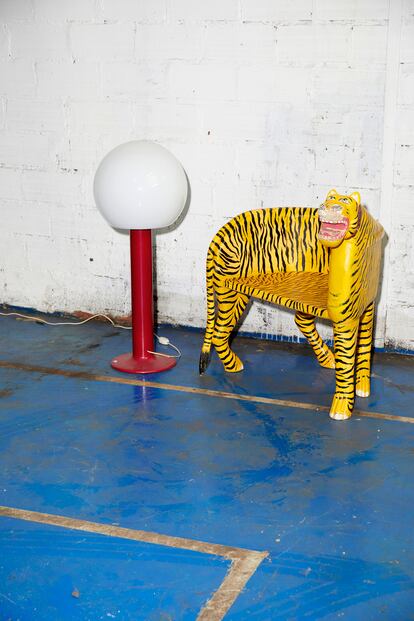
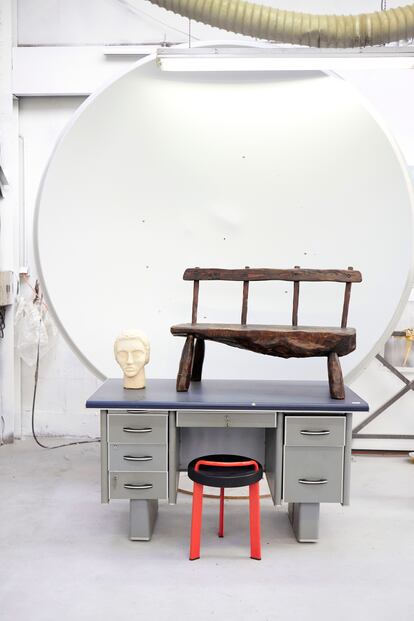
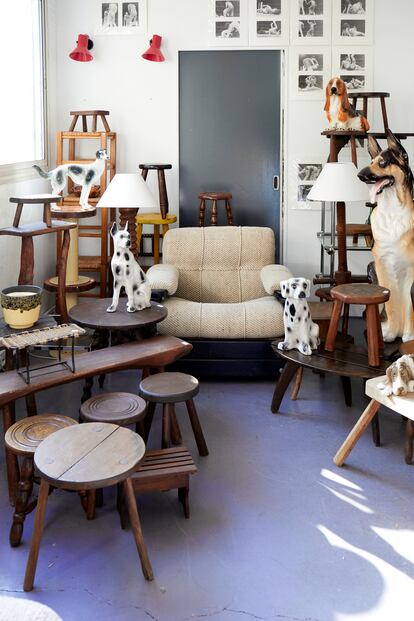
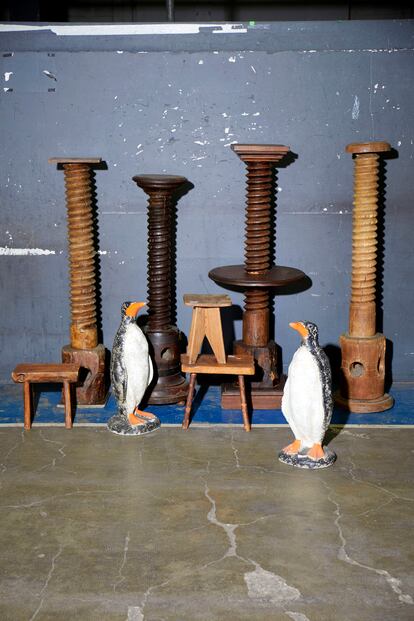

He moves like a fish in water around the French capital. “Right now, in Paris, people are more open. There’s good energy. Many people have come here from New York and London, especially since Brexit. The city has changed a lot, we all speak in English, and there’s also a lot of movement in the LGBTQ scene. It’s a good moment to be selling vintage in Paris.” Last year, the antique dealer Billore opened an exhibition entitled Stolen Objects From My Exes. “It let me connect with people through humor,” he says, laughing. “But I want to clarify that nothing I sell is stolen. I buy the majority of the pieces in the north of France, I have contacts there. I also don’t travel that much. It was never my intention to start a green business, but that’s how it turned out and I prefer that it stay that way. It doesn’t make sense to go far to buy things and have to turn around and send them from here to someone in the U.S. I don’t even send things out of Europe.”
Lately, his Parisian showroom has featured a major presence: his first chairs as a designer, a project that launched in November. “The back is made of little flames that are reminiscent of the emojis we use on Instagram. They’re instantly recognizable. The chair is a little bit ‘80s, but not too much. I made it for myself and now I’m going to start producing them on demand,” he explains. What hasn’t changed are the ceramic dogs that surround him. “They’ve always been my obsession,” he says. “I don’t sell them because no one wants them, but I keep buying them, so my apartment is full of them. I love dogs, I’ve always had a dog. But right now, with so much work and travel, it’s more difficult. I guess collecting them in ceramic is an easy way to compensate for the lack of real dogs.”
Sign up for our weekly newsletter to get more English-language news coverage from EL PAÍS USA Edition
Tu suscripción se está usando en otro dispositivo
¿Quieres añadir otro usuario a tu suscripción?
Si continúas leyendo en este dispositivo, no se podrá leer en el otro.
FlechaTu suscripción se está usando en otro dispositivo y solo puedes acceder a EL PAÍS desde un dispositivo a la vez.
Si quieres compartir tu cuenta, cambia tu suscripción a la modalidad Premium, así podrás añadir otro usuario. Cada uno accederá con su propia cuenta de email, lo que os permitirá personalizar vuestra experiencia en EL PAÍS.
¿Tienes una suscripción de empresa? Accede aquí para contratar más cuentas.
En el caso de no saber quién está usando tu cuenta, te recomendamos cambiar tu contraseña aquí.
Si decides continuar compartiendo tu cuenta, este mensaje se mostrará en tu dispositivo y en el de la otra persona que está usando tu cuenta de forma indefinida, afectando a tu experiencia de lectura. Puedes consultar aquí los términos y condiciones de la suscripción digital.









































